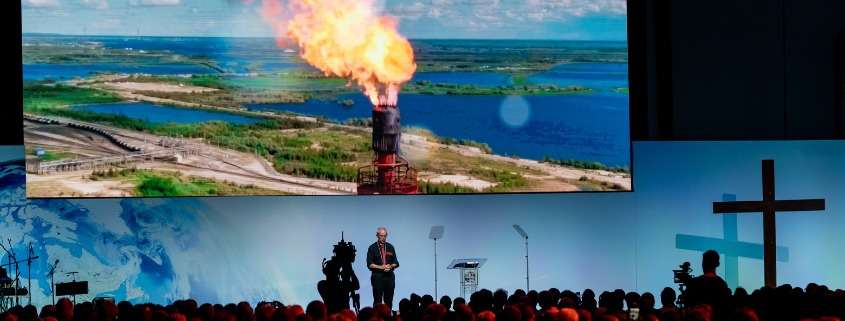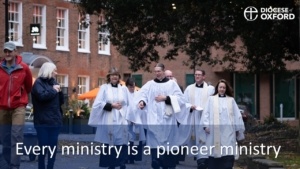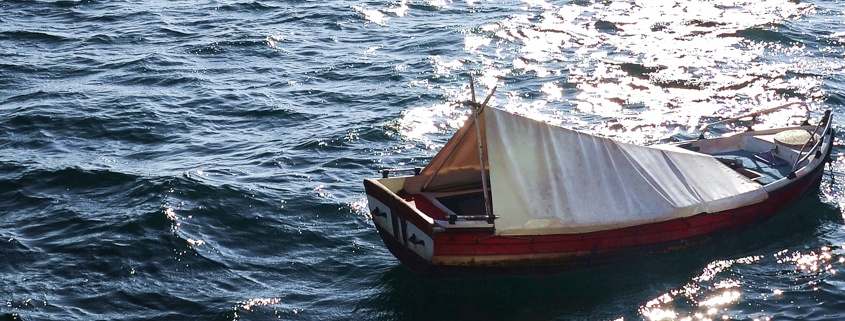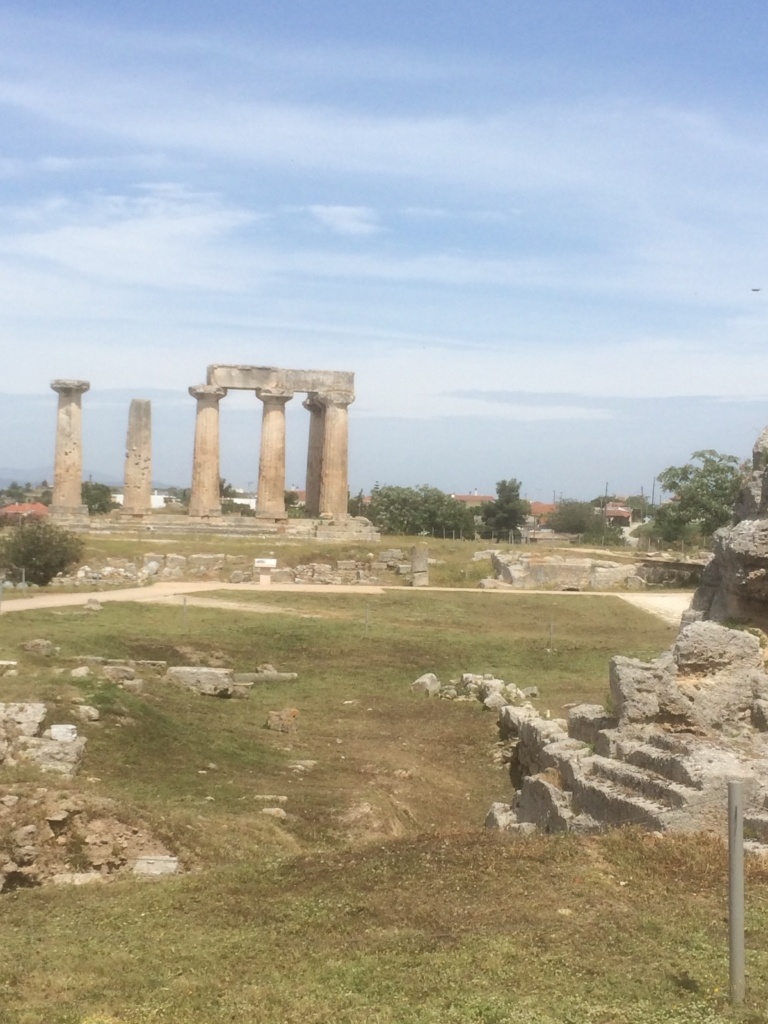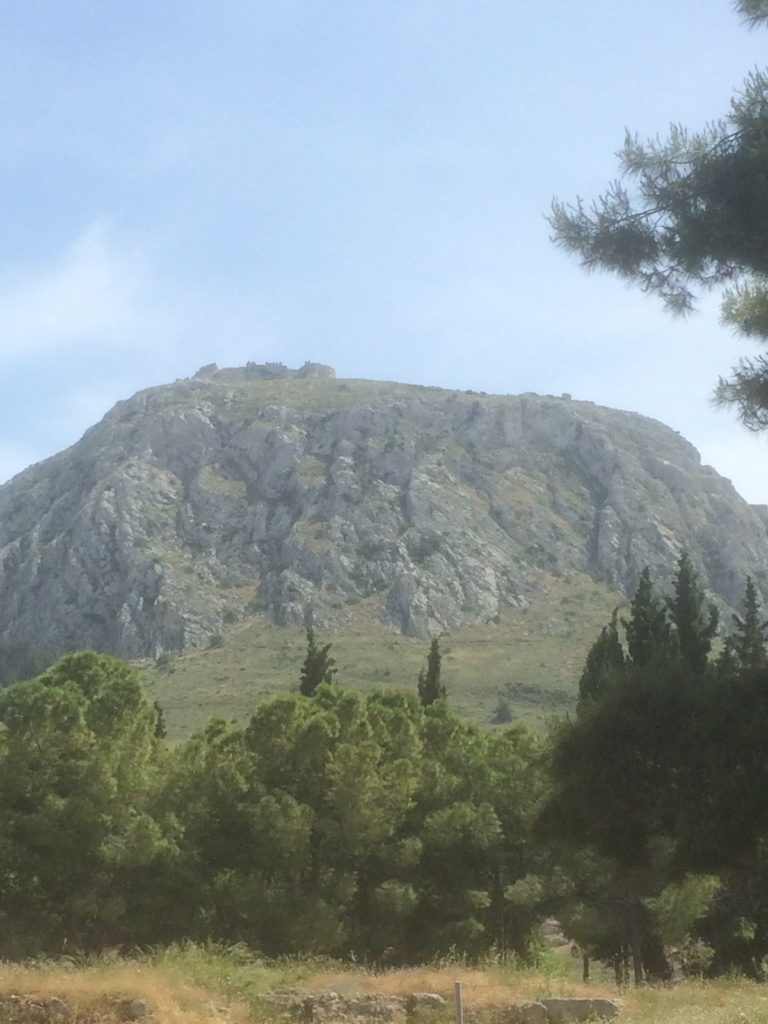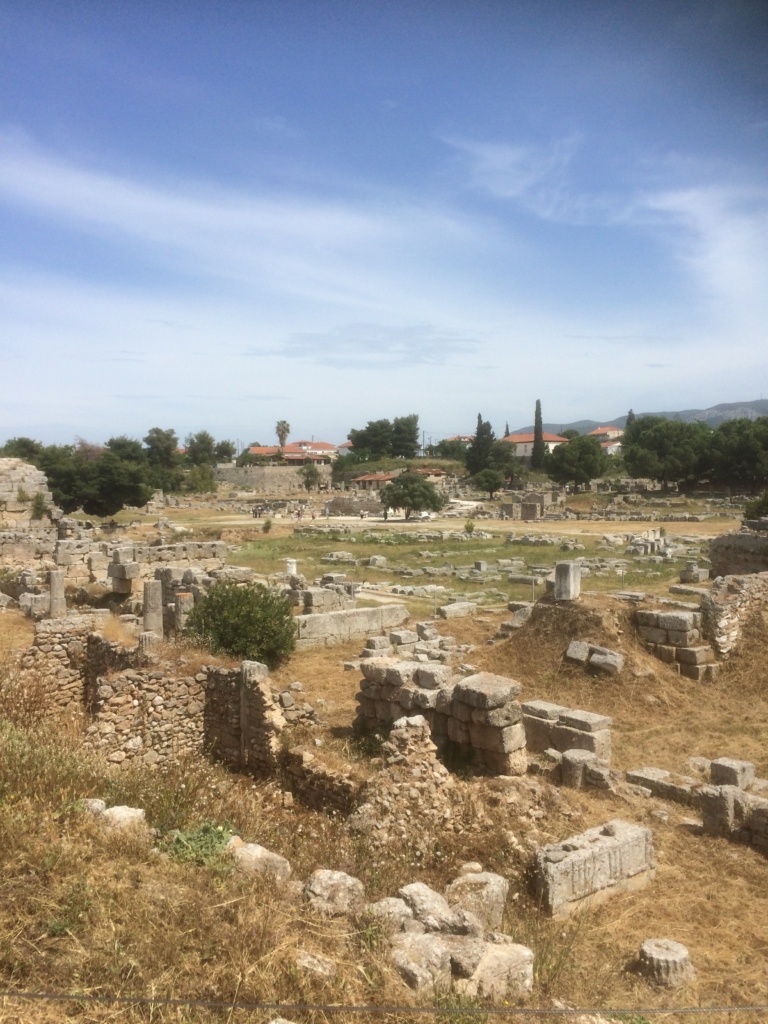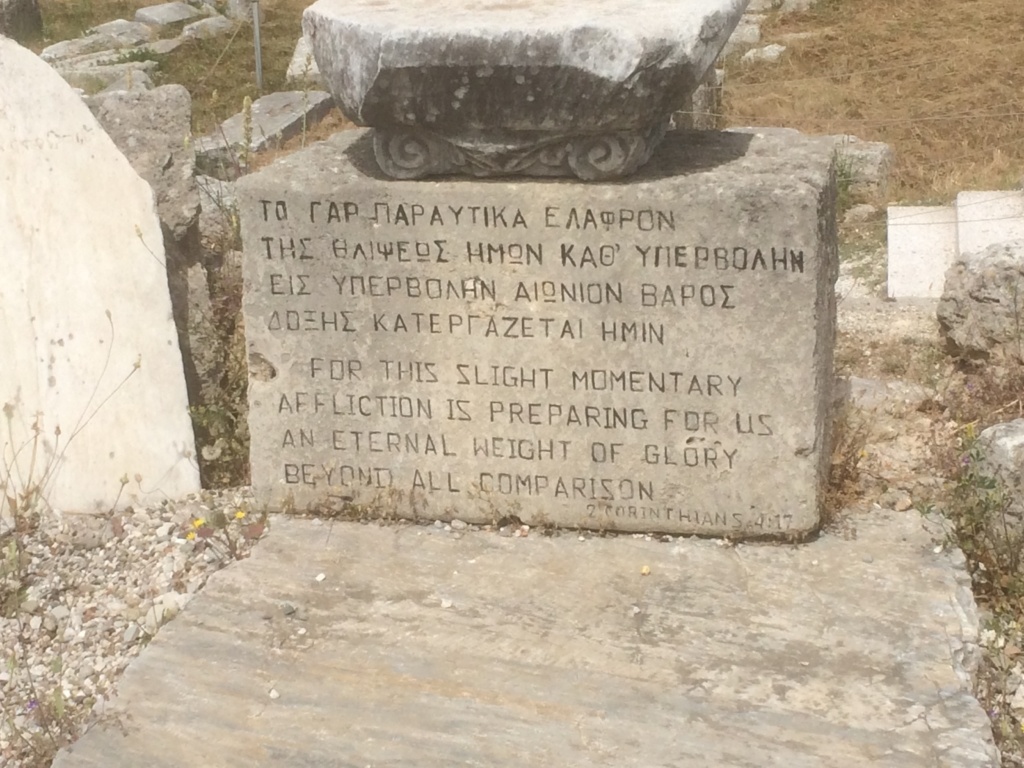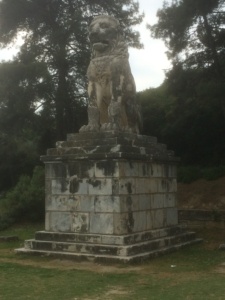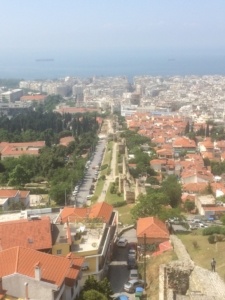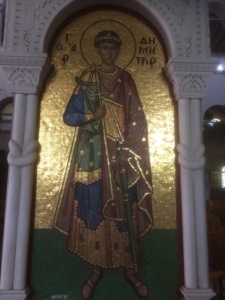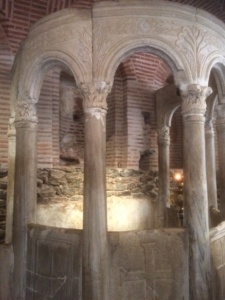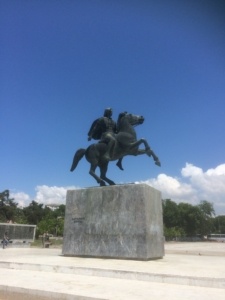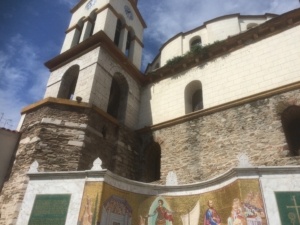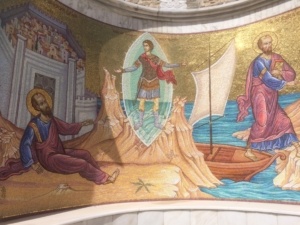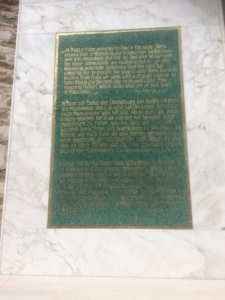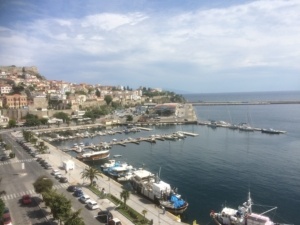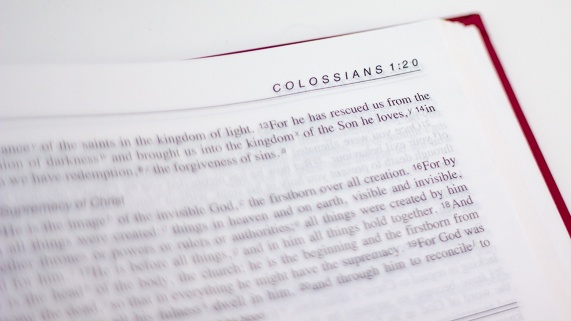Bishop Steven shares an overview of the key thread of Science and Faith at the Lambeth Conference held in Canterbury from 26th July to 7th August.
Posts
Bishop Steven’s address to Diocesan Synod in June 2022, calling on every household to respond to the climate crisis.
Bishop Steven’s address to Diocesan Synod in March 2022, focusing on the atrocities in Ukraine and our call to be a more Christ-like Church.
A Presidential Address to the Oxford Diocesan Synod, September 2020
It’s very good to regather virtually after the summer and to begin what I guess will be a season of regathering in a thousand different places as we begin to rebuild together after the lockdown. There will be great joy in this but also great challenge.
We will be rebuilding and regathering as local church communities and schools and chaplaincies and all their associated ministries and this will take time. We will be playing our part in sustaining villages and towns and cities across our Diocese as disciples as well as hospitals and universities and businesses and civic life. Thank you for all you continue to give in so many ways to this process. I’m deeply appreciative of the many signs of grace I have seen in so many different ways over the last six months. I thank God for you.
We are all aware that we begin this work of rebuilding in a season when we are still learning to live with COVID 19. In the coming months we will be dealing with the aftermath of the first wave of the pandemic: bereavement and ongoing sickness for many; emotional and mental illness for others; the economic effects of lockdown; difficulties in families; the effects on the education and well being of children and young people; and the disproportionate effects on some parts of our communities.
But we begin to regather also knowing that the storm is not yet over. There could well be still further serious disruption to the pattern of our lives, the risks of infection continue, especially for those who have been shielding, normal life cannot be restored in so many ways – and we do not yet know or see clearly whether this phase of living with the virus will last for six months or a year or even longer.
How then should we minister and serve our communities and God’s world in this next season, in a world in continuing crisis? How can we play our part as disciples and as citizens and play that part together as part of the Church of Jesus Christ?
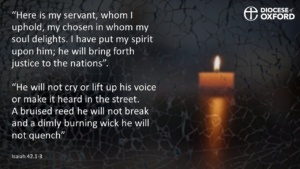 We all have wisdom to bring to this process and we will need insight from one other. But my starting point for responding to that question is to draw inspiration and our pattern from the humility and gentleness of Christ. I think these are the qualities we will need as disciples and as the Church in this season.
We all have wisdom to bring to this process and we will need insight from one other. But my starting point for responding to that question is to draw inspiration and our pattern from the humility and gentleness of Christ. I think these are the qualities we will need as disciples and as the Church in this season.
I am drawn especially to two biblical passages on these themes. The first is the tender description of the servant of God in Isaiah 42. The servant is called to minister to God’s people in a time of great crisis yet also great hope for the future. Isaiah 42 describes the kind of leadership which is needed in such a time of jeopardy and danger.
“Here is my servant, whom I uphold, my chosen in whom my soul delights.
I have put my spirit upon him; he will bring forth justice to the nations”. (42.1-2)
But how will the servant do this?
“He will not cry or lift up his voice or make it heard in the street.
A bruised reed he will not break and a dimly burning wick he will not quench” (42.3)
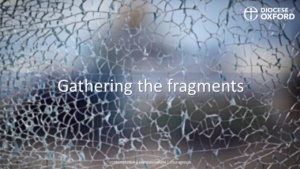 This is the kind of leadership which draws alongside people, which gathers the fragments, which liberates the gifts of others, which does not overwhelm, which listens and waits patiently to see what is emerging. This is the leadership we will need to exercise in the coming months as Christian disciples and as the church: the leadership of gentleness and tenderness and patience.
This is the kind of leadership which draws alongside people, which gathers the fragments, which liberates the gifts of others, which does not overwhelm, which listens and waits patiently to see what is emerging. This is the leadership we will need to exercise in the coming months as Christian disciples and as the church: the leadership of gentleness and tenderness and patience.
The second passage is the one I hope we will read together as we dwell in the Word in this coming year from Philippians 1 and 2. Paul describes the heart of the way in which Almighty God ministers in coming to a world in chaos and crisis and hurt.
“…he emptied himself, taking the form of a slave, being born in human likeness. And being found in human form, he humbled himself and became obedient to the point of death, even death on a cross” (Philippians 2.6-8)
The humility of Christ will be needed as we seek to rebuild together: the humility which is not only at the heart of the character of Christ but the humility which is at the heart of the pattern of the incarnation, of the substance of Almighty God taking flesh in Christ, of Christ by his Spirit creating the Church as his own Body, to continue his life-giving work in the world, a gentle, tender community of grace.
Humility will be key as we offer to support local communities and build up our neighbourhoods; as we draw alongside those in debt or financial difficulty; as we seek to support families in stress; as we reach out to the isolated and bereaved; as we share the purpose and the hope that we have found in Jesus Christ.
We do not offer what we offer of ourselves: we offer what is ours because of God’s grace to us. We do not offer what we offer from a sense of superiority or to create dependence. We are aware and conscious of our individual and corporate failings, how often we ourselves fall short. We know that as a church we stand in need of deep spiritual renewal. We will begin to find that renewal, I hope and pray, as we continue to centre ourselves on Jesus Christ, on his character, on the pattern of the incarnation and on serving the needs of the communities around us with the gentleness and tenderness of the servant.
The humility of Christ is not self-negation and the erosion of individual gifts, character or personality. Christian humility is the path to becoming our authentic selves, offering our whole lives to the purposes of God and the path of deep joy.
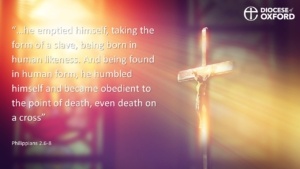 The humility of Christ is not surrender, withdrawal or submission as the world around us sees these qualities. Philippians 2 has sometimes been wrongly used to support a message from those who have power to those who have none, to suppress dissent and to resist change. This message in turn has supported the continued oppression of women or black people or the LGBTQI+ community. We can have no part in this either within the Church or in the engagement of the Church with the culture around us. Embracing the humility of Christ does not mean muzzling our prophetic voice or edge.
The humility of Christ is not surrender, withdrawal or submission as the world around us sees these qualities. Philippians 2 has sometimes been wrongly used to support a message from those who have power to those who have none, to suppress dissent and to resist change. This message in turn has supported the continued oppression of women or black people or the LGBTQI+ community. We can have no part in this either within the Church or in the engagement of the Church with the culture around us. Embracing the humility of Christ does not mean muzzling our prophetic voice or edge.
The humility of Christ is not weakness, finally, but strength, tenacity and determination to effect change for the sake of the kingdom of God, stepping into difficulties to seek to resolve them, not stepping away. But that strength, determination and power will need to be mediated through humility as we face the challenges ahead.
There will need to be a great deal of listening as we explore how best to re-open our churches for services of worship safely again and as we also continue with the online services which have sustained us during the lockdown. In many places this will take time. But I do want to offer encouragement to every benefice now to find ways to re-open for physical services of worship in the coming weeks and as we rebuild our sacramental life. I want to offer encouragement to every Christian disciple to reset their rule of life, giving priority to Sunday worship and to make their way back to Church physically as soon as it is safe and possible to do so.
We are flesh and blood and physical beings, not disembodied minds or spirits. God made us that way and God became a human person. That physical encounter is an essential part of our humanity. We may not yet be able to do everything we want to do when we gather as the Church on Sundays and on other occasions. We may need to regather in smaller numbers and in more restricted ways. But in those circumstances we should do what we can do safely to restore public and physical prayer and worship at the heart of every parish and community.
There will need to be a great deal of listening, especially, as we seek to rebuild our ministries with children and young people and families and offer support to our schools. As I have listened across the Diocese, this is probably the area among very many that has been hardest during lockdown. My own perspective will be that wherever possible it will be important to connect physically, to meet face to face, to begin community and young people’s groups and Sunday Clubs again, and to regather and reconnect families wherever it is safe to do so. Every school in every parish will need support and chaplaincy and care, not only our Church schools.
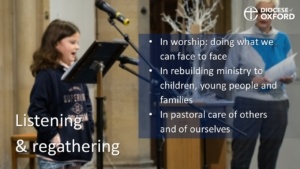 And there will need to be a great deal of listening to ourselves and to our own communities in a time when so many have been placed under stress and pressure. This is a season when all of us will need support and care. We will each need to watch over ourselves and one another and over the whole Church of God, with the same patience and tenderness and love which the servant of the Lord demonstrates in Isaiah.
And there will need to be a great deal of listening to ourselves and to our own communities in a time when so many have been placed under stress and pressure. This is a season when all of us will need support and care. We will each need to watch over ourselves and one another and over the whole Church of God, with the same patience and tenderness and love which the servant of the Lord demonstrates in Isaiah.
Those who have sustained the church over this period, lay and ordained, will still be very tired. Those who have traditionally been load-bearing walls in the Church may find that they begin to give way under accumulated pressures.
So this is a season to be alert as shepherds and pastors to those who are struggling, to the sheep who have wandered away or become distracted or tired, to the injured, to those who need particular care. That will include ourselves. We will need to be patient and gentle, to not break the bruised reed nor quench the dimly burning wick. We must not be in too much of a hurry.
Over the last few months as I have listened across the Diocese, I have found myself returning again and again, surprisingly actually, to the things I learned during the early years of Fresh Expressions. In forming new congregations for those who are outside the Church, the Church emerges and has to be thought through from first principles, in different contexts and places. The heart of pioneer ministry is tending this continuous reflection and development as the new community emerges by the grace of God in a different culture and context.
As the whole Church emerges into a new normal, in which so much is fluid and continuously changing, every ministry is now a pioneer ministry: leading, supporting and forming church in a new cultural context. This takes time and energy and hope. There are many setbacks along the way – but Christ is with us in the journey.
Thank you for your partnership and your prayers in this next part of our journey together. I look forward to learning much with you as together we discover what God is doing and join in as best as we are able.

Bishop of Oxford
Presidential address to Diocesan Synod
5 September 2020
Diocesan Synod took place as a Zoom meeting, this is the audio recording of +Steven’s address to Synod.
We stand at a key moment in the life of our Diocese. For two years, we have been exploring God’s call to us and our common vision. What kind of Church are we called to be? A more Christ-like Church for the sake of God’s world: more contemplative, more compassionate and more courageous. We want to set that vision of Christ at the heart of who we are. This remains our central vision.
(If you would prefer to watch +Steven deliver this address, scroll to the bottom of this page for the video.)
What are we therefore called to do together next? We have listened with God to the big questions facing our world: the environment; questions of poverty and equality; mental health; the challenges and opportunities we have as a Diocese. We have begun to respond to those questions in seven different areas of focus.
The first two parts of our common vision process continue. But a third question has come into focus over the last few months and will be our focus for the remainder of this year. How do we all share in this common vision? How do we enable every local church, every deanery, every benefice, every parish, every Christian to share in this process and find our place?
That question was our focus as the Bishop’s Council gathered at High Leigh a few weeks ago with over a hundred representatives nominated by each Deanery. It is my focus this morning. It will be our focus at four Area Days in the autumn. We hope every parish will share in those.
The challenge is significant and vital. How do we help one another move forward together in good and appropriate ways? We are, as we know, a living growing network of more than a thousand churches, chaplaincies and schools across three counties, serving vastly different communities. Each local place has its own texture and story, and so does each church. We are large churches and small churches. We are churches of every different tradition. We are chaplaincies and schools as well as parishes. How do we all find our place and discern what we are called to do as we work together?
There is a powerful moment in the story of the call of the first disciples told in Luke 5. Jesus is teaching by the lakeside. He gets into the boat of Simon Peter. After he has finished teaching, he says to Simon: “Put into the deep water and let down your nets for a catch”.
Simon answered, “Master we have worked all night long but have caught nothing. Yet if you say so, I will let down the nets”.
They put into deep water. They find a miraculous catch. Simon falls to his knees, saying: “Depart from me, Lord, for I am a sinful man”. Jesus says to him: “Do not be afraid. From now on you will be catching people”.
I hope that this is the moment when we want to say to each other as parishes and benefices and deaneries:
“Put into deep water and let down your nets for a catch”.
I expect that some people at least will respond in a similar way to the disciples: “Look, we have worked all night and caught nothing”. Ministry has not been too fruitful of late. The things we have done are not really making a difference.
But I hope they will go on to say: “Because that is the call of Jesus we will let down the nets”.
And I hope that in many different places, there will be the equivalent of a miraculous catch of fish: new disciples; renewed vocations in the workplace; a fresh relationship with schools; new congregations planted; childrens and youth work renewed; good news for the poor; the captives set free; signs of the Kingdom in ways we do not expect.
And I hope that in many different places we will fall down on our knees to God in wonder and amazement: “Depart from me O Lord for I am a sinful person” as we see the great harvest of the Kingdom beyond our expectations.
Two important principles
How do we help every parish and benefice and deanery engage with this big vision for mission as a more Christ-like Church? Before I talk about some very practical tools, let me first establish two important principles.
The first turns around that moment in the gospel story where Simon Peter responds to Jesus:
“If you say so I will let down the nets”.
If our common vision process is only about doing what the Bishop says or what the Diocese says then we will not bear fruit. The Church of Jesus is simply not that kind of organisation. I do not have the power or the authority to enable this vision to happen or to persuade PCC’s in distant corners of the Diocese to do any part of it. Nor do I want such authority.
The only person in the life of the Church who is able to call the Church to mission is Christ. It is when the local church hears the call of Christ that we will let down the nets: because you say so. That is why the process of renewal begins and continues and ends in encountering God in Jesus Christ and setting Christ again at the centre of our common life. As we focus on Christ then we begin to hear in different ways that call to be good news to the poor and set the captives free. We hear again the command to put out into deep water and let down the nets. We engage in mission in ways which are life-giving to the church do not drain away our energy.
Because you say so. Because Christ says so: Jesus who is fully God and fully human. Christ who shows us what God is like and Christ who shows us what it is to live an abundant life.
Many a parish vision statement flounders because God’s people do not first catch a fresh vision of Christ and all they hear is because the Vicar says, so I will let down the nets. Even more diocesan visions fail because God’s people do not first catch a fresh vision of Christ. All they hear is because the Bishop says so I will complete my mission action plan. But when we hear the call of Christ in the Scriptures and in the beauty and need of the world, then we are ready for the deep.
That is why it is vital to keep our call to be Christ-like right at the centre of everything we do in common vision. That’s why it is vital for local churches to engage with this process at the right pace. That is why tools and resources need to be full of hope and life and full of Christ’s call, not ours.
My second principle is that this common vision and call will unfold in very different ways in our very different deaneries and parishes.
We are not all the same. We are not all in the same place in our growth and development.
God’s Spirit is a Spirit of infinite variety and creativity. Right from the beginning, let’s give one another the opportunity to do things differently. That is essential because of our different contexts, but also it’s something to delight in for its own sake.
Another danger of parish and diocesan visions is that they value too much the virtues of standardisation, efficiency and control: a tendency that John Drane and others have called the McDonaldisation of the Church.
But those virtues are the opposite of the gifts the Spirit brings of creativity, diversity, new gifts and life. It is those gifts we need to cherish in our common vision process. Church is often renewed through what happens at the margins and on the edge. Church is rarely renewed from the centre and by the plans of bishops.
Our goal is not to encourage as many churches as possible to do the same thing in the same way. Our goal should be to encourage churches to engage in common vision in a thousand different ways according to local discernment and to learn from one another as we go.
New tools and resources
So what are the tools we are developing to help local churches and deaneries engage with the process? They are summarised in this leaflet.
 The first is our development fund, which is formally launched today. All the documents about the fund are live on the website now. Applications are open for the first round of funding. We are making £1 million per year available for three years to support local mission. Not every response to common vision will need funding. Many will be resourced locally. But making funds available in these ways we hope will help and encourage local creativity and diversity and lead to the renewal of good local mission.
The first is our development fund, which is formally launched today. All the documents about the fund are live on the website now. Applications are open for the first round of funding. We are making £1 million per year available for three years to support local mission. Not every response to common vision will need funding. Many will be resourced locally. But making funds available in these ways we hope will help and encourage local creativity and diversity and lead to the renewal of good local mission.

The second is our Parish Planning Tool, building on all we have learned through Mission Action Planning and appreciative enquiry tools and Partnership for Missional Church. We hope that parishes and deaneries will pick up and begin to engage with the tool as we move into the autumn as the time is right for you to renew your present plan.
The Parish Planning Tool is not something you have to use. It is a resource to help. It’s a tool which is designed to build hope and confidence and put the value of being a more Christ-like Church right at the heart of our planning for mission. The Parish Planning Tool is in its final stage of development. It will be published in August for use in September and can be pre-ordered here.
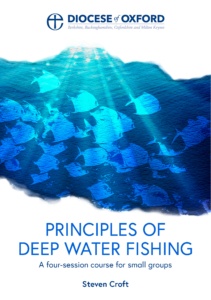 The third is a new series of Bible Studies, Principles of Deep Water Fishing (available to pre-order), which I hope will resource this particular part of our common vision process. They are based on the talks I was able to give at the High Leigh conference on Acts 16-20, and I hope will help local churches catch the vision for what it means to put out into Deep Water.
The third is a new series of Bible Studies, Principles of Deep Water Fishing (available to pre-order), which I hope will resource this particular part of our common vision process. They are based on the talks I was able to give at the High Leigh conference on Acts 16-20, and I hope will help local churches catch the vision for what it means to put out into Deep Water.
The fourth is a series of four Area Days in the autumn. Invitations will go out to every parish in the next week or so and we will invite every place to send some people to catch the next stage of the vision and to work with the new planning tool.
Common vision in the life of the Diocese
Finally and briefly, what is happening to common vision in the life of the Diocese? There are new developments in each of the seven focus areas. These were reported at High Leigh, and the short films of those reports are on the diocesan website.
Our plans for chaplaincy in schools are moving forward well. Personal Discipleship Plans have gone well in the pilot stages and are beginning to be rolled out across the Diocese. We are preparing two major bids to the national Strategic Development Fund to support the development of new congregations, the first for the whole Diocese and the second focusing on Milton Keynes; environmental audits are being slowly taken up by parishes; our working group on children and young people is due to report in the autumn.
The Bishop’s Staff and Bishop’s Council have given very careful thought to the proposal to increase our capacity in the three large Episcopal Areas. As you know, three of our archdeaconries are twice the average size, and the archdeacons’ workload is increasing. We agreed in May to a proposal to appoint three full-time assistant archdeacons, one in each area, to build on the excellent work being done by our current assistant archdeacons. We propose funding that for the initial year from our common vision funds and then blended funding thereafter hopefully thereafter as part of our normal running budget with the proportion increasing by 20% per annum. However, we recognise that this decision needs to be fully owned and understood by this Synod and so we will bring this one back in November with a paper to give Synod a full opportunity to comment before we move ahead.
There is much more going on in the life of the Diocese than can be embraced by common vision. The 2018 Synod Reports give a fuller picture. I also want to draw Synod’s attention to the development of our voluntary chaplaincy to LGBTI people and their families that fulfils one of our commitments in the Pastoral Letter, Clothed with Love which we issued in November.
We are called together to put into deep water and let down the nets. We are called to do this not because of any human imperative or scheme. We are called to do this because of the call of Christ. May Christ continue to be at the centre of all we seek to be and do together.

Bishop of Oxford
Presidential address to Diocesan Synod
15 June 2019
Watch Bishop Steven deliver this address
Click the speaker icon in the bottom right of the video frame to switch on audio.
Over four talks Bishop Steven explores God’s mission in Macedonia, in Greece and in the great city of Ephesus. In this final session, he sets out the sixth and seventh principles for deep water fishing. How might we become more like Christ on this journey, and how will we cope with the trials and tribulations that will surely come along the way?
If you would prefer to watch +Steven teach this session, scroll to the bottom of this page for the video.
Session 4: Miletus
At the end of the central section of Acts, Luke sets the most remarkable and influential speech in the entire book. It stands as a retrospective. From Miletus, Paul sends for the elders, the presbyters, of the Ephesian Church.
This is the only speech in Acts addressed to Christian ministers. It is the place where the Paul of Acts sounds most like the Paul of the epistles. It is a retrospective not only on the mission to Ephesus but to the whole of Acts 13-19. Paul has distilled here the things which make a difference in his Christian mission and ministry: the things which really make a difference.
Acts 20 has shaped the Church’s understanding of ministry in every age and every generation. I have never found an ordinal which doesn’t reference it. The greatest texts on ministry in every age have been shaped especially by 20.28: “Keep watch over yourselves and over all the flock”. That one verse sets the shape of Gregory the Great’s pastoral rule; of Richard Baxter’s book, The Reformed Pastor and of George Herbert’s manual, The Country Parson.
The early Church has not yet settled its language of ministry. In the Epistles we see the Church trying on of various sets of language and ideas: the concept of the church as a body; the diversity of gifts; the different ministries needed to build up the body of Christ.
Three terms begin to emerge which will carry what it means to minister in the Church of God in the later New Testament period and forward into Christian history. All three occur in or around this passage. Luke is very deliberate in his use of language. None of them is used in a technical sense. You might say that they represent ministry in three dimensions of all the people of God.
The first is diakonia (διακονίαν) in the sense of service and commission from which we take the concept of some people being ordained deacon (24).
The second is presbyteroi (πρεσβύτεροι): the elders who are invited to meet with Paul (17) from which the Church grows the idea of some being ordained priests to the ministry of word and sacrament;
The third are the episkopoi (ἐπίσκοποι), (28) from which the Church develops the idea of some being ordained as bishops to watch over the flock in the name of Christ. But it is the ministry of every believer which is being spoken of throughout this passage with some called to distinctive roles for the sake of the whole body.
So what is Paul’s first and most fundamental lesson in Christian mission and ministry? What is the first principle he passes on here for deep water fishing?
“You yourselves know how I lived among you the entire time from the first day that I set foot in Asia, serving the Lord with all humility and with tears, enduring the trials that came to me through the plots of the Jews”.
These are the words I want to highlight and to contemplate: You yourselves know how I lived. The words literally mean: how I was among you. Paul does not refer back to his techniques for spreading the gospel or to his technical proposals for church growth in Asia. He doesn’t refer to his bold plan or strategy. He doesn’t refer either to his doctrine in first place.
Those things are not unimportant. But they are not in the first place.
In the first place is the way he lived, the way he was, his character and his identity in Christ. Paul especially commends his humility, his tears, his endurance of trials. It is not too much to read into this the words of Jesus in the beatitudes: humility – blessed are the meek; tears – blessed are those who mourn, trials – blessed are those who are persecuted.
It is not too much either to see here a lifting up of contemplation, compassion and courage in the life of God’s church and in the life of God’s ministers. You yourselves know how I lived. This is how the speech begins. There is a bracketing here: a rhetorical device known as inclusion. For right at the end of the speech, Paul returns to exactly the same theme: how I was among you.
“You know for yourselves that I worked with my own hands to support myself and my companions. In all this I have given you an example that by such work we must support the weak, remembering the words of the Lord Jesus, for he himself said, It is more blessed to give than to receive”.
The pattern of Anglican ministry and mission is deeply incarnational: being like Jesus as a church and as minister. We live as an imperfect community of love in every place in this Diocese. We are scattered from Monday to Saturday to 50,000 different places like salt.
We come together week by week to be strengthened for this witness and to live consistently but imperfectly with the gospel we proclaim. Those communities are nurtured and sustained by those whom God has called as lay ministers of different kinds and by deacons, priests and bishops.
This has always been God’s strategy: to pour out the Holy Spirit on the disciples in every place, to help us together be a community of love, and to draw others by that love to the truth of the gospel.
This was the way in which the early Church grew in the first three centuries: because of love consistently displayed. This is the long way back for the Christian gospel in this land: by modelling patience, kindness and goodness to the communities we are called to serve.
This is the sixth principle of deep water fishing: mission and ministry is incarnational – primarily about being more like Christ, more loving.
6. Mission and ministry is primarily about being more like Christ: more loving
Paul’s speech affirms some of the other principles for deep water fishing we have explored. Paul affirms the lessons he has learned about the need for courage and perseverance both for himself and for the new communities these ministers will serve. He affirms over and over again the principle that social transformation is built on deep Christian formation:
“I did not shrink from doing anything helpful, proclaiming the message to you and teaching you publicly and from house to house”. That twofold division, publicly and in households is worth pondering. “Remember that for three years I did not cease night or day to warn everyone with tears”.
Paul affirms by his confidence the very first of our principles: the Holy Spirit directs and guides the mission of God, and one of the things the Spirit does is to remove the apostle Paul from the new churches so that others are encouraged to grow into the space Paul leaves behind. Our aim in mission and ministry is not to create dependence but interdependent communities of disciples, each called to use our gifts in Christian service.
Principles for Deep Water fishing
1. The Holy Spirit is guide and director
2. God works in unexpected ways and unexpected people
3. Different places respond in different ways to the gospel
4. We need to be courageous, to persevere and try, try, try again
5. Social transformation is founded on deep Christian formation
6. Mission and ministry is primarily about being more like Christ: more loving
7. Death and resurrection, joy and pain are woven finely together in God’s mission.
Principles for Deep Water fishing is one of four Christ-like Church Bible studies written by Bishop Steven. Browse the collection and order your copy here.
7. Death and resurrection, joy and pain are woven finely together in God’s mission.
But it is the final principle which comes over to me most clearly as I listen to this text on the one hand and am privileged to listen to stories of ministry across our diocese on the other. What do I hear in both places?…
It’s hard. It’s very hard. It’s almost impossible. It is much more difficult than you might think to make progress in the Kingdom.
Paul has learned that in every place there will be pain and difficulty and setbacks of all kind. They have been different in the different places we have visited in Macedonia, in Greece and in Ephesus. But the common feature is that the difficulties are always present.
One of the things we need most in our theology and understanding of ministry and mission is a theology of suffering and difficulty, of death and resurrection. This is not an easy way.
Paul is about to begin a long journey of arrest and trials which will culminate in house arrest in Rome and later to his own martyrdom. Luke chooses not to end Acts with the high point of Paul’s ministry in Ephesus but with Paul under house arrest in Rome.
I was formed in the charismatic evangelical tradition. I still love the songs of Graham Kendrick, which tells you as much about my taste as my abiding affection for Meatloaf. I was brought up to read Acts in the major key: to emphasise the joy and the glory and the triumph of the gospel.
I think my richest experience of teaching scripture ever was when I was Warden of Cranmer Hall. I developed a new Masters Module on Mission and Ministry in the Acts of the Apostles. There were 12 students in the class, and they were from different church backgrounds and different parts of the world. I learned so much from their perspective and particularly from a Roman Catholic lay student. The theme she developed in every chapter of Acts was the place of suffering in the Christian life and in Christian ministry. I had never seen it before. I have not been able to unsee it since.
This ministry and mission we are called to is the interweaving of joy and pain, of death and resurrection, of the major and the minor key. It is a warning against triumphalism or the expectation that this will be easy. Moving forward will be hard in all kinds of ways.
But it is the way we are called to go. It is the way of Christ.
Our discipleship and ministry is likely to be very hard as well as, God willing, very fruitful. That is what it means to put down into deep water and let down the nets.
That is why we need to support and hold one another. That is why we need a community which is larger than a single local church. That is why we need a culture of gentleness and love and respect and encouragement as we launch hundreds if not thousands of new mission projects.
Some will fail. All will be difficult. But many will be extraordinarily fruitful, by the grace of God, and the fruit will last for generations. We are called come out of the stands for the spectators and into the arena.
American President Theodore Roosevelt made a speech in 1910 on citizenship in a republic. I would like to end this study with a quotation from that speech, made famous by the American researcher and storyteller Brene Brown who writes on vulnerability and courage.
The quotation describes exactly I think the movement Paul is seeking in Acts 20 and the movement we are seeking across this Diocese:
“It is not the critic who counts; not the man who points out how the strong man stumbles, or where the doer of deeds could have done them better. The credit belongs to the man who is actually in the arena, whose face is marred by dust and sweat and blood; who strives valiantly; who errs, who comes short again and again, because there is no effort without error and shortcoming; but who does actually strive to do the deeds; who knows great enthusiasms, the great devotions; who spends himself in a worthy cause; who at the best knows in the end the triumph of high achievement, and who at the worst, if he fails, at least fails while daring greatly, so that his place shall never be with those cold and timid souls who neither know victory nor defeat.”
Contemplative, compassionate, courageous for the sake of God’s World
We have a vision as a diocese to be a more Christ-like Church for the sake of God’s world. We go from here to make that vision a reality.
+Steven
Common Vision Conference
High Leigh, 10 May 2019
Watch Bishop Steven deliver this talk
This session was first given at the Common Vision Conference in May 2019.
Click the speaker icon in the bottom right of the video frame to switch on audio.
Over four talks Bishop Steven is exploring God’s mission in Macedonia, in Greece and in the great city of Ephesus. In session three he invites us to imagine the effects of early Christianity in Ephesus… ‘it’s as if Bicester Village and the Westgate Centre in Oxford decided it was not worth opening on Sundays any more and signed petitions against the church and the effects on local business.’
This page includes images and text by the Revd Janet Minkkinen of St Andrew’s Church Cippenham who is on pilgrimage. If you would prefer to watch +Steven teach this session, scroll to the bottom of this page for the video.
Session 3: Ephesus
One of the most moving and powerful scenes in the Acts of the Apostles is the picture of Paul walking alone into Ephesus: a major city of the Empire, larger than anywhere he has yet proclaimed the gospel. Ephesus is the stronghold of the cult of Artemis. It is a cultural crossroads between East and West and the gateway to Asia Minor and the Eastern Empire. Paul arrives alone. He is putting out now into very deep water indeed.
The mission to Ephesus is sometimes called the third missionary journey. In fact, it’s a two-year ministry in a single city which has an effect on the whole region. The story of mission to Ephesus is told over two chapters and draws to a close the middle section of Acts which began in Antioch in Acts 13 with the sending out of Paul and Barnabas.
This is the high point of Paul’s ministry. The third section of Acts, 21-28, is sometimes called the Passion of St Paul. Acts 21-28 describes Paul’s arrest and various trials and imprisonments on his way to Rome in chains.
The lessons of deep water fishing are here again, of course. The Holy Spirit is guide and director. Again at the beginning of a new ministry, Luke makes deliberate reference to the Holy Spirit. There is a sense that God is already at work. Paul finds 12 disciples who believe in Jesus. These Christians have not been taught the whole of the faith. Their catechesis is incomplete.
There is a question and answer session perhaps based around an early catechism:
Do you believe and trust in God the Father who made the world?
Yes, Paul, we believe and trust in him.
Do you believe and trust in his Son Jesus Christ who redeemed the world and rose again?
Yes, Paul. Apollos told us about Jesus and we have been baptised.
Did you receive the Holy Spirit when you became believers?
No. We have not even heard that there is a Holy Spirit.
In Macedonia, Luke emphasises the ways in which God is already at work in the lives of individuals and the many different ways people come to faith. In Greece, Luke stresses the different responses to the gospel in different places and the need to persevere through difficulties.
In Ephesus, the stress is on the cornerstone of ministry. Paul grounds his ministry on good catechesis. His first priority is to lay a sure and full foundation of Christian faith in the lives of the new believers. They are taught and baptised and into the name of the Lord Jesus. Paul lays his hands on them. There is a new Pentecost: they speak in tongues and prophesy. Luke says rather coyly, “There were about 12 of them”. He is making a theological point.
There is then courage and perseverance in the face of difficulty. When one opportunity ends, another begins. Obstacles become opportunities.
“He entered the synagogue and for three months spoke out boldly and argued persuasively about the kingdom of God. When some stubbornly refused to believe and spoke evil of the Way before the congregation, he left them, taking the disciples with him, and argued daily in the lecture hall of Tyrannus. This continued for two years, so that all the residents of Asia, both Jews and Greeks, heard the word of the Lord”.
This is careful, intentional, daily formation of enquirers in a safe and neutral space which extends over a long period of time. This is catechesis. This is one of the essential building blocks of making disciples and of forming new congregations. This is the ministry about which we have so much to learn. This is part of what it means to put out into deep water. There is nothing shallow or superficial about the faith Paul is teaching, and the Ephesians are learning.
(scroll down to continue)
Janet writes: “I have spent my last day at Corinth and Cenchreae as we said farewell to Paul as he journeys to Ephesus. So we read Acts 18. One night the Lord said to Paul in a vision. ‘Do not be afraid, but speak and do not be silent; for I am with you.’ In our world were sometimes we are afraid, let us place our fears with God, let us open our hearts so that our Lord will strengthen them, let us be like Paul and speak of God’s love to all people in all places in our words and actions and use every opportunity courageously to bear witness.” – 20 May 2019
All the lessons Paul has learned are focussed here. The ministry is extraordinarily effective. All the residents of Asia, both Jews and Greeks, heard the word of the Lord. There are extraordinary miracles, signs and wonders as there have been in times of great revival. There are unorthodox methods not repeated in any other place: the blessing of handkerchiefs and aprons; healings and exorcisms. There are signs of spiritual battle and spiritual victory.
Most significantly, there are massive changes in the lifestyle and economy of the city. The hold of the practice of magic and the occult on the city is broken.
“A number of those who practised magic collected their books and burned them publicly, and when the value of these books was calculated, it was found to come to fifty thousand silver coins”.
If a silver coin is a year’s wages, we are talking millions of pounds in today’s values.
The economy of the region is changed so significantly that the livelihood of the silversmiths is threatened. The silversmiths make shrines of Artemis for the pilgrims who come to Ephesus. Demetrius, their leader, stirs up the city to rioting. It is a measure of Paul’s courage that he wants to address the assembly. Where we might have seen a dangerous mob, Paul sees only a potential congregation. Only with great difficulty is the riot stilled and calm returns.
It takes some doing to imagine the effects of early Christianity in Ephesus. It is as if the gospel was preached to such effect that every betting shop and bingo hall in Milton Keynes closed down for lack of business. It is as if Bicester Village and the Westgate Centre in Oxford decided it was not worth opening on Sundays any more and signed petitions against the church and the effects on local business. This is an enormous change. It provokes very significant opposition.
We will look a little more in session four at what happens in Ephesus as we read Acts 20. But what are the lessons for deep water fishing we might take from today?
Each of our first four lessons are here.
- The Holy Spirit is guide and director of God’s mission
- God works in unexpected ways and unexpected people
No-one would build a strategy on handkerchiefs and aprons. We have to respond to events not simply roll out a predetermined strategy. - Different places respond in different ways to the gospel
Ephesus is clearly more fruitful than elsewhere for a range of reasons. - We need to be courageous, to persevere, to try, try and try again.
This is exactly what Paul is doing through every twist and turn.
There is I think a fifth lesson in Ephesus when we combine what is said in Acts 19 with the retrospective in Acts 20. In Acts 19, we read of the daily teaching in the Hall of Tyrannus. In Acts 20, Paul looks back at the ways in which his ministry in Ephesus is founded on this deep sustained ministry of Christian formation through teaching and encounter with Christ: on catechesis.
Paul will look back on his ministry with these words:
“I did not shrink from doing anything helpful, proclaiming the message to you and teaching you publicly and from house to house, as I testified to both Jews and Greeks about repentance towards God and faith towards our Lord Jesus” (20.20-21). Later in the same speech, Paul will say: “For I did not shrink from declaring to you the whole purpose of God”.
So my fifth lesson for deep water fishing is this:
Social transformation is founded on deep Christian formation.
In Ephesus, the whole economy of the region begins to be transformed. But the heart of that renewal is deep Christian formation: teaching and encounter with God.
We are at a really significant point in the life of our own nation. The tide of knowledge and understanding of the Christian faith has been going out for some time. People know less and less about Christian faith. They have fewer and fewer resources to cope with change and the demands of life and suffering and grief. The fragmentation in our society is clear.
There are many things we want to see changed, and it is very good to work in partnership where we can with other faiths and people of good will on the great issues of our day.
But deep change and transformation in society comes as children and young people, women and men encounter the living Christ in the power of the Spirit. This has happened in the life of our country many times in the past: in the time of Cuthbert and Augustine of Canterbury; at the Reformation; in the time of Richard Baxter of Kidderminster; in the time of the Wesleys.
We need again in the 21st century a deep investment in the whole of the Church of England such that every parish church becomes again what it is designed to be: a place of Christian formation and catechesis; a place for learning and teaching the faith and encountering Christ again. Social transformation is founded on deep Christian formation.
As children and young people and women and men encounter Christ and our lives are reshaped and re-ordered, and we are equipped in our discipleship then we live out our faith in every area of our lives. We gather as a church for worship, which renews and deepens our faith and understanding week by week and month by month. As we do that, then the world begins to be changed and transformed. Social transformation is founded on deep Christian foundation.
The centre of our renewal in mission and ministry, for me, is this renewal of every church and every new congregation as a place of Christian formation. This vision flows from our journey to be a more Christ-like Church: more contemplative, more compassionate and more courageous. Our greatest gift to the world is the gift of a new generation of mature Christian disciples.
The renewal of catechesis may not feature in any single funding bid to our new mission fund. It may be as simple as following an annual cycle of sowing the seed of the gospel, nurturing faith, bringing people to baptism and confirmation, ongoing growth through personal discipleship plans and firepits. But this is the way the local church goes on to transform the world. This is what it means to put out into deep water wherever we are and to have confidence in the message we are called to bear.
This is the key transformation our whole Church of England needs: to have such confidence in the gospel that every parish church becomes again a place of deep Christian formation where the whole faith is taught which will lead again to deep social transformation across our nation.
That will happen first through a renewed confidence in God and in the Christian gospel which does not depend on numbers or visible results: which receives with thanksgiving the fruit we can see and trusts in God for the fruit we cannot.
It will happen second through the cherishing of individuals and families and doing all we can to teach the faith to small numbers of people in thousands of different places. It will happen third through sufficient depth in our formation to embrace pain and difficulty and suffering as well as the good and joyous elements in our lives.
May God give us grace to put out into deep water and let down our nets for the renewal of these ministries.
Let us pray.
God of love
The sea is so great and our boat is so small.
Inspire your church as we put out into deep water
Help us to be contemplative, compassionate and courageous in your mission.
Guide us by your Spirit to discover where you are working
Help us to join in the building of your kingdom
And anoint us afresh to make disciples in your name
For the sake of your Son Jesus Christ who calls us and sends us
With you and the Holy Spirit, one God now and for ever. Amen.
+Steven
Common Vision Conference
High Leigh, session 3, 9 May 2019
Watch Bishop Steven deliver this talk
This session was first given at the Common Vision Conference in May 2019.
Click the speaker icon in the bottom right of the video frame to switch on audio.
Over four talks Bishop Steven is exploring God’s mission in Macedonia, in Greece and in the great city of Ephesus. In session one we discovered the first two principles of deep water fishing: the Holy Spirit directs and inspires new movements of mission, and God is already at work in unexpected places and unexpected people. In session two we travel to Greece and the story of how the disciples put out into deep water in strange cities where no-one had ever proclaimed Christ…
This page includes images and text by the Revd Janet Minkkinen of St Andrew’s Church Cippenham who is on pilgrimage. If you would prefer to watch +Steven teach this session, scroll to the bottom of this page for the video.
Session 2: Greece
Luke describes in Acts the different ways in which Paul and his companions put out into deep water and let down the nets. Luke’s focus in Acts is on evangelism and church planting, but that focus is clearly set within the broader horizon of God’s mission and God’s kingdom.
In Macedonia, we drew out the first two lessons to inspire our own work. The first is that the Holy Spirit directs and inspires new movements of mission. The second is that God is already at work in unexpected places and unexpected people: Lydia and the young girl and the jailer and his family. Renewal in mission is not usually about steady and incremental change. It can often be about deep water and risk and the new thing that God is doing.
From Macedonia, we move on now to Greece. In Acts 17 and 18, Paul moves through four of the major cities of Greece. He visits Thessalonica and begins his mission in the synagogue. This is the pattern familiar from Acts 13 and 14. People come to faith. The Jews become jealous. They drive Paul out from the synagogue then stir up the city authorities against him. You may remember the famous taunt: “Those people who have been turning the world upside down have come here also”.
Silas and Paul move onto Beroea. Here the reception is completely different: “They welcomed the message very eagerly and examined the scriptures every day to see whether these things were so”. The mission here bears fruit until people come from Thessalonica and stir up this city also against Paul.
From Beroea we come to Athens. Paul spends time watching and listening to this city full of idols. He debates not only with the Jews but in the market place with the philosophers. Eventually, he speaks to the assembly on the Areopagus, and we hear for the only time in Acts an address to educated and literate citizens in a famous university city.
But the fruit of this ministry in Athens is meagre. “When they heard of the resurrection of the dead, some scoffed; but others said, “We will hear you again about this”. At that point, Paul left them. But some of them joined him and became believers including Dionysius the Areopagite and a woman named Damaris and others with them”.
There is to be no great intellectual breakthrough in Athens.
Then finally in Greece, Paul comes to Corinth where he is to stay for 18 months to found the Church with his colleagues Priscilla and Aquila. We know about Paul’s ministry here from the Corinthian letters as well as from Acts 18. The church here is a church of and for the poor. The ministry here is a much more fruitful ministry. The Lord appears to Paul in a vision and says this: “Do not be afraid but speak and do not be silent; for I am with you, and no one will lay a hand on you to harm you, for there are many in this city who are my people”. He stayed there for a year and six months, teaching the word of God among them.
Again and again, the disciples put out into deep water in strange cities where no-one has ever proclaimed Christ. Paul and his companions are doing what Jesus commands Peter to do in Luke 5. Paul and his companions are doing what we are called to do in Amersham and Didcot and Charlbury and Ascot.
What lessons can we learn? There are of course three I want to highlight, though I haven’t managed to make them begin with the same letter. They all seem to me to be very important to our work.
(scroll down to continue)
Janet writes: “We missed out the towns of Amphipolis and Apollonia, but stopped to see this huge statue of a Lion that Paul must have seen. The Lions are normally in places where battles have taken place in about 300BC. From there we made our way into Thessaloniki named after Alexandra’s the Great sister. In Thessaloniki Paul tries to explain that Christ first had to suffer and then be resurrected from the dead. Some were persuaded, but many were unhappy with his words of hope. As Bishop Steven reflects on the deep water that we are to go out into, we also need that steadfast hope and trust so that we too are faithful to the truth. I visited the church of St Demetrios coming face to face with his relics. His witness and martyrdom makes you reflect, that is very very deep water. Many Christians around are world are persecuted for their faith and belief in Jesus Christ and refusing to be silent. I feel humbled and pray for courage.” – 14 May 2019
Principle number 3: different places respond in different ways
(see the previous talk for principles one and two)
The first is simply stated but really difficult to take on board for all of us. The same gospel proclaimed by the same people in different places provokes a very different response:
Rejection in Thessalonica, a warm welcome in Beroea. Indifference in Athens. Passionate welcome in Corinth. Different places respond in different ways to the gospel.
We can’t always see the reason for this, especially if we don’t have ourselves wide experience of the church in different places.
As you will know, I served for seven years as the Bishop of Sheffield. Church attendance is very low in Sheffield per head of population. If you go back in time and look at figures from the past, it remains historically very low across all denominations. No-one quite understands why. Whatever is happening in the wider world and whatever strategies are adopted, relatively low church attendance remains.
Within our own Diocese, we have at least two areas, South Bucks and the city of Oxford, where church attendance and churchgoing remains high relative to national trends. It’s possible to point to some reasons for that. But we also have other areas where attendance is as low as anywhere in the country, particularly in the major conurbations of Reading, Slough and Milton Keynes.
In our many rural areas, congregations are very small relative to urban and suburban communities. But as a proportion of the population, they are often very high, particularly at Christmas and other major festivals.
So as we put out into deep water, we need to expect that the outcomes and the responses will be different in different places. We are not going to see neat and uniform growth. We should not put that burden of expectation on one another. One of the marks of authentic mission will be that the response and fruitfulness will be different in different places.
The Bible uses the agricultural metaphors to understand and describe this. In some places the ground is too hard. It needs to be broken up and ploughed and made ready. In others, the time is right to sow seeds and begin new ministries which may take years to come to fruition. In others, there is a crop ready for harvest. Sometimes we can see this in advance. But most of the time, we can’t.
I don’t think Paul knew that his ministry would be better received in Beroea than in Thessalonica. I don’t think he would have changed his itinerary if he did know that.
Now we love as a church to measure outcomes. This is largely a product of our insecurity. Like our forebears, we seek validation in numbers. We love to compare one ministry and place with another. Sometimes we do it to bolster our confidence and because we need the affirmation. Sometimes we do it to pull ourselves down and prove again to ourselves that we have failed or that our ministry is not of value.
I have a friend who worked in inner-city ministry, and he would often say that when suburban clergy get together, they play the game of my congregation is bigger than your congregation. When inner-city clergy get together, they play a different game: my area is worse than your area – a kind of clerical version of Monty Python’s sketch of the four Yorkshireman. “Outside toilets. You were lucky.”
We need to be prepared for the outcomes to be different – some more difficult, others more positive and fruitful and affirm both. That’s one of many reasons why beginning with appreciative inquiry [expect to see more about appreciative inquiry from the Diocese in the coming weeks] and affirmation seems the right way to plan.
One of the things I have heard very clearly across such a large Diocese is that we must be very wary about transferring unrealistic expectations from one part of the Diocese to another which then become impossible burdens and sap the confidence of the church.
It’s wonderful that as a Diocese we have several large churches in the centre of Oxford. I praise God for them. But we cannot take the expectations of growth and success in those large churches and transfer them onto small congregations in rural West Berkshire. The soil is very different. The resources are different. The story is different. Acts underlines this again and again.
The rural church is very different from the suburban church. The inner city is different from the suburbs. Inner city Slough is different from Blackbird Leys on the edge of Oxford though both may be deprived. The Diocese is made up of thousands of different places, each with its own story and its own response to the gospel. God is at work in each. But we must avoid the temptation to standardise, to project expectations. We must allow for difference.
Principle number 4: we need to be courageous
My second lesson for deep water fishing from Greece is the lesson that we need to be courageous, to persevere and try again. We need this courage especially in respect of past failure whether that is specific failures in mission or the general climate where ministry has not been fruitful or particular failures such as safeguarding or division in the life of the Church.
All of these things sap our confidence and morale. When confidence and morale and hope are low, it is really very hard to get out the boats and put out into deep water and let down the nets.
Imagine the courage and confidence required by Paul in these two transitions. He moves from Thessalonica where there has been hostility and rejection and apparent failure to Bereoa. He is not to know as he walks into Bereoa that things will be different. But they are, at least for a while.
Even more, imagine the courage and confidence to move from Athens to Corinth. Paul has been mocked in Athens in a very public court appearance. There has been very little fruit. He gathers himself and finds the courage to put out into deep water again and goes to Corinth. There are signs he does some things differently. There is a much greater emphasis on teamwork rather than a solo mission. There are signs in I Corinthians that there was a major shift in his preaching and teaching. This is how Paul describes in his own words the beginnings of his ministry in Corinth:
“When I came to you brothers and sisters, I did not come proclaiming the mystery of God to you in lofty words of wisdom”. You might think this was exactly what he was trying to do in Athens.
“For I decided to know nothing among you except Jesus Christ, and him crucified. And I came to you in weakness and in fear and in much trembling” (I Corinthians 2.1-3).
It’s really difficult to find the courage to start again. It’s especially difficult to find the energy to start again in a completely different place: not to simply do again what you have always done but slightly differently.
We all know the answer to the question how many PCC members does it take to change a lightbulb?
Answer: Change?
Or the story of the Yorkshire bishop who asked a churchwarden how many years he had been in office. ’40 years’ came the reply. ‘You must have seen a great many changes in that time said the Bishop’. ‘Aye,’ said the Warden. And I’ve opposed every single one of them’.
Hats off to clergy and PCCs who are bold enough to put out into deep water. To the young mum who dares to suggest employing a families worker. To the curate who leads an environmental audit. To the Vicar who raises the question of a new informal service in a rural benefice. It’s not easy to start again. We need to cherish every person who has the passion and boldness to make a suggestion and cherish even more the person who rolls up their sleeves to have a go.
I’ve been reflecting recently on the next steps in renewing catechesis across the Diocese: the ministry of welcome and accompanying new Christians to baptism and confirmation. It’s such a key ministry for the renewal of our mission.
We have a long way to go.
I think one of the chief obstacles is a lack of courage and confidence. Offering an annual way in which people can learn about faith and explore as enquirers feels in too many places a very significant risk for the clergy. What if I offer this and no-one comes? What if they come and no-one comes to faith?
It won’t be the same in every place, but we need to encourage one another. That again is why it is so important to root all of our planning and ventures in encouragement and affirmation and building hope and confidence in the people of God. The local church is not a problem to be solved. In the present context, clergy and congregations need nurture and inspiration to get back into the boat, to put out into deep water and to let down the nets.
Nobody can read Acts 17 and 18 and say Paul had an easy ride. We can read Acts 17 and 18 and see that there is an iron determination in Paul’s mission simply to keep going, as Paul will say later, to fulfil the ministry which God has entrusted to him. We need that iron determination that dogged perseverance in God’s mission across this Diocese.
Let us pray.
God of love
The sea is so great and our boat is so small.
Inspire your church as we put out into deep water
Help us to be contemplative, compassionate and courageous in your mission.
Guide us by your Spirit to discover where you are working
Help us to join in the building of your kingdom
And anoint us afresh to make disciples in your name
For the sake of your Son Jesus Christ who calls us and sends us
With you and the Holy Spirit, one God now and for ever. Amen.
+Steven
Common Vision Conference
High Leigh, 9 May 2019
Watch Bishop Steven deliver this talk
This session was first given at the Common Vision Conference in May 2019.
Click the speaker icon in the bottom right of the video frame to switch on audio.
All the way through the Acts of the Apostles the disciples are living out Luke 5. They continually put out into deep water, let down the nets and see what happens even in the most unlikely circumstances. +Steven traces part of that story over the course of four talks looking in turn at God’s mission in Macedonia, in Greece and in the great city of Ephesus. What lessons can we seek to learn as we turn our boats away from the shore to deep waters and let down the nets for a catch?
This page includes images and text by the Revd Janet Minkkinen of St Andrew’s Church Cippenham who is on pilgrimage. If you would prefer to watch +Steven teach this session, scroll to the bottom of this page for the video.
Session 1: Macedonia
The story of the spread of the Christian faith across the Roman world is a story full of surprises. It is a story of both suffering and joy. It is a story of human endeavour and God’s agency. It is a story to which the Church has returned again and again through two thousand years as we seek fresh inspiration in God’s mission. It is the story told by St. Luke both in the gospel and in his second book, the Acts of the Apostles.
In every era of the Church, Christians have turned to Luke’s great narrative to find renewal and to return to first principles. In the eighth century AD, the great English historian Bede bases his Ecclesiastical History on the Book of Acts. In the early twentieth century, the Anglo-Catholic theologian, Roland Allen reflects on the story of Christian mission in China in his seminal book: Missionary Methods, St. Paul’s our ours?. In the late twentieth century, the American Episcopalian priest Dennis Bennet turns to Acts to describe his experiences of God which were the beginnings of charismatic renewal in his book Nine O’clock in the Morning.
In these talks, I want to continue this tradition of reflection on the principles of Christian mission in Luke and Acts. We are reflecting together as a Diocese on what it means to be a Christ-like Church for the sake of God’s world: contemplative, compassionate and courageous. We have listened carefully to the kind of church we are called to be in the Beatitudes, in the story of the raising of Lazarus and in the Letter to the Colossians [you can find the common vision study guides on our online store].
We are now at the point where we are beginning to move forward in God’s mission together: to attempt new things in new ways for the sake of the kingdom of God. We are doing this as a single Diocese and also in our parishes, benefices and deaneries and in our schools and chaplaincies.
As we begin to act and to do new things, so this is a good moment to listen to the Book of Acts, as framed by Luke, and to find fresh inspiration for mission in our own day.
The Gospel of Luke
The Gospel of Luke is not simply Part One of a two-part work. The Gospel is the most important of the two volumes. The Gospel frames the story of the Church which follows. In particular, Luke sets the horizon for Christian mission in his gospel through two key passages set near the beginning of Jesus’ ministry. The first is in Luke 4, the second in Luke 5.
In Luke 4, Jesus comes to the synagogue in Nazareth and reads from the Book of Isaiah. You will know the passage:
“The Spirit of the Lord is upon me, because he has anointed me to bring good news to the poor. He has sent me to proclaim release to the captives and recovery of sight to the blind, to let the oppressed go free, to proclaim the year of the Lord’s favour” (Luke 4.18).
Jesus rolls up the scroll, hands it back to the attendant and sits down. “Then he began to say to them, “Today this scripture has been fulfilled in your hearing.” The horizon of Christian mission is set wide. The mission of Jesus is about the transformation of the whole world and the bringing in of the kingdom of God.
Luke 5 then sets a frame for one central part of Christian mission: the calling of disciples to follow Christ and to be agents of God’s kingdom. Jesus is teaching by the lakeside. He gets into the boat of Simon Peter. After he has finished teaching, he said to Simon: “Put out into the deep water and let down your nets for a catch.” Simon answered, “Master we have worked all night long but have caught nothing. Yet if you say so, I will let down the nets.”
They put out into deep water. They find a miraculous catch. Simon falls to his knees saying: “Depart from me, Lord, for I am a sinful man.” Jesus says to him: “Do not be afraid. From now on you will be catching people.”
This is the moment we have reached in the story of our own Diocese and of our common vision. At the end of this conference, I hope every person here will be willing to say to the parishes and deaneries: “Put out into deep water and let down your nets for a catch.”
I expect that some people at least will respond in a similar way to the disciples: “Look, we have worked all night and caught nothing”. Ministry has not been too fruitful of late. The things we have done are not really making a difference. But I hope they will go on to say: “Because that is the call of Jesus we will let down the nets.”
And I hope that in many different places, there will be the equivalent of a miraculous catch of fish: new disciples; renewed vocations in the workplace; a fresh relationship with schools; new congregations planted; children’s and youth work renewed; the captives set free; signs of the kingdom in ways we do not expect.
And I hope that in many different places we will fall down on our knees to God in wonder and amazement: “Depart from me O Lord for I am a sinful person” as we see the great harvest of the kingdom beyond our expectations.
This process is not about the rolling out of a strategy; it is not about fixing a problem. This process is about being a contemplative, compassionate and courageous church: about putting out into deep water and letting down the nets and seeing what God will do.
(scroll down to continue)
Janet writes: “The journey in St Paul’s steps begins in Neapolis, modern day Kavala. The place where St Paul steps ashore from Troas is St Nicholas Church. The beautiful mosaic shows the man of Macedonia calling Paul: ‘Come over to Macedonia and help us.’ Those words spoke to me deeply. Who is calling me! Who is calling you, are you willing to go out into deep waters as Bishop Steven shared with us? Paul was so brave crossing into new lands, into Europe, bringing good news to our land. The last picture is the view from my hotel balcony, the harbour full of fishing boats all is calm and at peace.” – 12 May 2019
Principles for deep water fishing
All the way through the Acts of the Apostles we see the disciples living out Luke 5. They continually put out into deep water, let down the nets and see what happens even in the most unlikely circumstances. They are continually amazed in different ways at what is happening which is beyond their expectations.
Renewal in mission is not really about business as usual. It is not about a bit more of the same. The renewal in mission we need is about deep waters, about adventure and risk and joining in the new thing God is doing.
Over this series of talks, I want to trace part of that story as told in Acts 16 to 20. We will look in turn at God’s mission in Macedonia, in Greece and in the great city of Ephesus and seek to learn lessons as we turn our boats away from the shore to deep waters and let down the nets for a catch.
The story begins in Macedonia. Paul and his team are stuck. They do not know where to travel next. They try one way and then another.
“They went through the region of Phrygia and Galatian, having been forbidden by the Holy Spirit to speak the word in Asia. When they had come opposite Mysia, they attempted to go to Bithynia but the Spirit of Jesus did not allow them; so passing by Mysia they went down to Troas. During the night, Paul had a vision: there stood a man of Macedonia pleading with him and saying, “Come over to help us”. Only then do they set sail.
Principle number 1: the Holy Spirit is guide and director.
At every point in the Acts of the Apostles where new things happen in mission, the Spirit does something new. This is not human endeavour. This is the work of God. God is already at work. The work is rooted in listening: in contemplation which is itself guided by compassion and shaped by courage.
Paul and his companions sail to Philippi, a leading city of the district of Macedonia and a Roman colony. Philippi is very deep water. The gospel has now crossed into Europe – a whole new continent and culture. We are beyond the edge of the Jewish diaspora now: the places where the Jewish community has spread. This makes Philippi different. It is a completely new town. Think of the many new towns which will be built in our diocese over the coming 12 years. The population here is mainly former soldiers.
There is no synagogue. This may not seem significant to us but it is very significant to Paul and his companions. They have a method for proclaiming the gospel up until this point. Find the synagogue. Preach there until thrown out. Form a church.
There is no starting place in Philippi. It looks at first as though Philippi is very unpromising territory. The kind of place where you might fish all night and catch nothing. So where to begin? By praying and looking and listening. By the time the Sabbath comes round, the disciples have discovered that there is a place of prayer by the river and a number of women who are worshippers of God gather there. God is already at work. This is the place to begin.
Principle number 2: God works in unexpected ways and unexpected people.
Everyone’s story is different. Paul may be looking for converts just like himself: promising rabbis in the making. But one of the signs of authentic mission is unexpected conversions. The three most prominent converts in Philippi are a migrant businesswoman and dealer in purple cloth; a young mentally fragile slave girl and the town jailer and his family. Not the most promising and obvious raw material for a new church, we might think. But these are the ones in whom God is working and working powerfully and working differently.
Luke is a profound student of Christian formation. Acts takes great care here in describing the ways in which each of the three Philippian converts comes to Christ. The language in each case is unique as each person’s story is unique.
With Lydia, Paul uses the metaphor of hospitality. There is first hospitality of the heart, language of an opening door: “The Lord opened her heart to listen eagerly to what was said by Paul”. God has been at work already, preparing Lydia. At the right moment, God brings Paul to speak by the river. The Lord opened her heart. Lydia and her household are baptised: this is the first of two mentions of baptism in Philippi.
Then the hospitality of the heart is mirrored in the hospitality of Lydia’s home. The new Church is given a base and a meeting place. “If you have judged me to be faithful to the Lord, come and stay at my home”. And she prevailed upon us.
Paul and his companions are making things up as they go along. That’s what it is like to put out into deep water.
The second convert is a slave girl. She follows Paul and his companions crying out after them. Eventually, the slave girl is set free. But Paul and Silas are imprisoned by her owners. There is a public beating. Paul and Silas are put in prison.
Even in prison there is rejoicing. In the midst of the rejoicing there is an earthquake. The jailer believes the prisoners have escaped and rushes in to end his life. But the prisoners are still there. The jailer himself is set free.
Then there is another beautiful symmetry. The jailer washes the wounds of Paul and Silas. Then he and all his family are baptised without delay. There is a double washing, a twofold liberation.
God works in unexpected people in unexpected ways. The beginnings of the Philippian church remind us that this work sometimes begins with just one individual or family. If we are to see this renewal in mission across our Diocese, we will always need to begin with just one household, just one person, to see new life come to birth. A new congregations is planted. Paul and his companions eventually move on.
Our first two principles for putting out into the deep:
[1] The Holy Spirit is guide and director.
[2] God works in unexpected ways in the most unlikely people. Christian mission is neither neat nor tidy.
Our common vision
As a Diocese, we are reflecting on how we encourage one another in this renewal in mission in ways which are contemplative, compassionate and courageous. It would be all too easy at this moment in time for the common vision process to become a programme with measurable, predetermined outcomes, something tame and domesticated, geared to helping the Church be a slightly bigger church, a slightly better church, a slightly more efficient church.
This is not our calling. We are looking for our common vision to be a wider and wilder process, following the Spirit’s call. We are encouraging one another to put out into deep water, to be open and obedient to the Spirit, to open up the spaces for God to be at work, to look for God’s work in the most unlikely places and people, to see what God will do.
The deep water is an uncomfortable place. When we set sail, we entrust ourselves to God.
Let us pray.
God of love
The sea is so great and our boat is so small.
Inspire your church as we put out into deep water
Help us to be contemplative, compassionate and courageous in your mission.
Guide us by your Spirit to discover where you are working
Help us to join in the building of your kingdom
And anoint us afresh to make disciples in your name
For the sake of your Son Jesus Christ who calls us and sends us
With you and the Holy Spirit, one God now and for ever. Amen.
+Steven
Common Vision Conference
High Leigh, 8 May 2019
Go to session 2
Watch Bishop Steven deliver this talk
This session was first given at the Common Vision Conference in May 2019. The session had started with a power outage…
Click the speaker icon in the bottom right of the video frame to switch on audio.
A year ago I invited the Diocese of Oxford to listen to God through a particular passage of Scripture: the beatitudes of Matthew 5.1-10.
We are exploring our call to be a more Christ-like Church for the sake of God’s world: more contemplative, more compassionate and more courageous.
I know from different conversations, gatherings and written feedback that this has been very fruitful. Many groups listened to God through the beatitudes through dwelling in the word during meetings.
More than 6,000 people engaged with the study booklets we produced on the beatitudes and on Lazarus. Many churches developed sermon series or other good ways of study.
One of the main conclusions of our year of listening is that we need to do this more and continue to focus on what it means to be a more Christ-like Church. Lots of good practical strategies have emerged for local churches and for the diocese and these are moving forward.
However this listening is more important than anything we may decide to do, individually and together. I am therefore inviting the whole Diocese to a second year of listening, this time through the Letter to the Colossians and especially Colossians 1.15-20 and Colossians 3.12-17.
Again the focus will be on exploring more of what it means to be a Christ-like Church. The first short passage focusses on Christ, the second on the life of the Church. Again, there will be many different ways to listen through the text. Here are two resources to begin the process:
- A print-out of the Bible passage suitable for use when dwelling in the word
- The addresses I offered at the clergy conference in May on Colossians 1-3
The Diocese will be producing a short study booklet similar to the Beatitudes booklet in time for use in Advent 2018 or Lent 2019 based on these addresses. More details later.
I hope that listening to God in this way through scripture will resource our personal lives and also the life of every local church. Over the course of the next year, the Diocese is planning to develop a very simple resource to support renewal and mission locally which builds on all we have been learning through this process of developing fresh vision.
A year ago we established six working groups to look at what we might attempt to do together. These groups have listened deeply to Scripture and to the Diocese. They have developed plans which flow from this call to be a more Christ-like Church for the sake of God’s world. I gave a recent update on these at the Diocesan Synod in June. There will be further updates in the coming months.
But we want to begin a new academic year not with a whole list of things to do and not with a range of goals and targets or a fifteen point comprehensive strategy.
Jesus said to Mary and Martha: one thing is needed. In a time of great challenge for the world and for the Church, we are called to listen and ponder and reflect on what it means to become a more Christ-like Church for the sake of God’s world: more contemplative, more compassionate and more courageous.
Grace be with you
+Steven
September 2018

